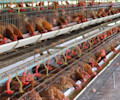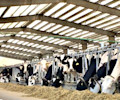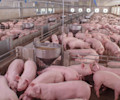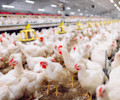Animals raised on factory farms in the U.S. alone generate more than 1 million tons of manure per day — more than three times the amount produced by the country’s human population. ‘Factory farming pollution creates particular concerns around the storage of animal waste. This is because when manure is stored, microorganisms in manure decompose the organic matter and release a number of pollutants.
Causes of land degradation
Pesticides and fertilisers
Pesticides and fertilisers used on crops fed to animals are a major contributor to land pollution. Inevitably, a portion of fertilisers washes into waterways along with eroded sediments and this can lead to the creation of dead zones that kill aquatic life. Additionally, use of artificial fertilizers in place of manure can eventually deplete soils, making them lose their ability to hold water and makes them subject to erosion.
Improper disposal of waste
With its vast size and scale the intensive farming industry is a major contributor of waste. The high concentration of livestock in factory farms inevitably results in a build-up of animal waste. When factory farms spray liquid manure onto fields, the amount of waste applied often exceeds what the crops can take up, leaving the rest to escape into the air or runoff into surface waters. This improper collection and disposal of untreated animal waste can harm soil health local water supplies and human health. If antibiotic-resistant bacteria are present in manure, this can also spread to the wider environment with applied as manure.
Livestock & agricultural deforestation and logging
Livestock production already consumes 83% of global arable land and consequently there is a clamour to reallocate forests into agricultural land. It’s estimated that between 1991-2005, 70% of deforestation in the Amazon Basin could be attributed to the beef industry. Meanwhile, global forests, once a crucial carbon sink, have been cut down at such an alarming pace that they are now a net contributor to GHG emissions.
Effects of intensive farming on land use
Habitat destruction and degradation
The earth loses about 18.7 million acres of forests per year and the agricultural industry’s demand for more land is a key driver. About 80% of the world’s plants and animals live in forests and are losing their habitats to deforestation. This is putting species under the threat of extinction.
Introduction of chemicals to ecosystems, food chains and environments
In order to convert forests to agricultural land, the clear-cutting process utilises herbicides such as glyphosate, spraying it on the land as part of the site preparation, in order to kill off underbrush. After all trees and other plant life have been removed, the site is again saturated with chemicals. Mammals living in the forest invariably ingest these chemicals, which are then passed along through the food chain as a result of bioaccumulation.
Loss of natural resources
Native forests with indigenous trees and plants are put under threat by clearcutting to create more agricultural land. Loss of these natural resources can also have negative consequences for medicinal research and effect the livelihoods of local populations that rely on the animals and plants in the forests for hunting, food and medicine.
The costs of factory farming – how land degradation and pollution impacts investors
Intensive farming causes damage to land and ecosystems which can negatively impact investors. Growing awareness is now developing around the side effects of pesticides and fertilisers used heavily on crops fed to farmed animals. A portion of fertiliser is being washed into waterways. Similarly, the use of artificial fertilizers in place of manure can deplete soils, making them lose their ability to hold water and increases the likelihood of erosion, which in turn makes soil less hospitable to growing crops. This jeopardises the value of agricultural land, and creates risks for food companies dependent on it for their products.
The Earth is losing more than 18 million acres of forests per year, equal to about 27 football fields every minute. It is estimated that 70% of deforestation in the Amazon Basin is attributed to the beef industry. As regulation and consumer behaviour increasingly moves to protect environmental limitations investors will seek to minimise exposure to the most damaging and polluting companies.
For example, we partnered with some of the world’s largest asset managers – including Dutch asset manager APG and Legal & General Investment Management – to support efforts to halt deforestation and adopt sustainable land management practices in the Cerrado region of Brazil. We also worked with a coalition of more than 70 institutional investors, including Aviva Investors and Natixis Asset Management, to engage 20 global food companies to limit antibiotic use in their supply chains.











